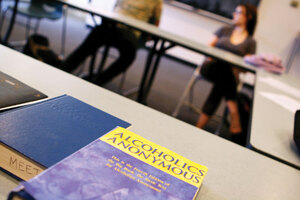After hiatus, Alcoholics Anonymous returns to USC
“Hi, I’m Paul and I’m an alcoholic.”
“Hi Paul,” the attendees greeted in unison.
At Wednesday night’s Alcoholics Anonymous meeting, six recovering addicts took turns sharing stories of their struggles to overcome alcoholism and drug addiction. The meeting — the second weekly meeting at USC after a hiatus of more than two years — began at 6 p.m. in University Religious Center room 205 with the reading of the AA preamble. Together, the members recited the Serenity Prayer.
“God, grant me the serenity to accept the things I cannot change, courage to change the things I can, and wisdom to know the difference.”
Paul S., a senior majoring in health sciences, attended his first AA meeting three years ago at USC. He explained that unlike other addicts, he had no legitimate reason to start drinking alcohol.

Anonymous · Recovering alcoholics meet at the University Religious Center once per week to share their struggles in overcoming addiction. USC has not hosted regular meetings in more than two years. - Amaresh Sundaram Kuppuswamy | Daily Trojan
“I come from this perfect Leave it to Beaver family and Beaver’s got a drinking problem,” he said. “My mom is the sweetest person — she makes Martha Stewart look like an amateur. There was nothing that made me start drinking.”
During his childhood, Paul’s family often added wine to their drinks as a Croatian cultural tradition, he said. As he got older, Paul began to understand that the good feeling, which came with consuming those drinks, was because of the alcohol mixed in.
“The last time my drinking was pure was when I was 9 years old,” he said. “After that, I was sneaking into the liquor cabinet.”
Paul said he started drinking and smoking marijuana every day. He also took pills every day when he began working at a pharmacy.
He reached his “bottom” — the low point in which he realized he needed help — when he was regularly injecting heroin to the frequency that his parents began noticing it. Yet he did not want to become sober, he said.
“The only reason I got sober is because I started going to the AA meetings that [my rehabilitation center] told me to,” he said. “I’ve been sober almost five years now … I’m really grateful to be sober. I mean it.”
Wednesday’s meeting was the second AA meeting USC has hosted this year. Several years ago, AA meetings existed on campus but the program disappeared until this semester.
The USC Office of Religious Life recently revived the meetings, though the office is not involved in the program. The office solely provides a location for the meetings and the staff does not sit in on meetings or necessarily know the students who attend.
Unlike most groups on campus, there is no one leader at the AA meetings. Each member is able to vocalize his stories equally, and as one member tells his story, the group is silent and listens.
Also, because USC provides a location for meetings, students do not need to pay any fees to come, nor must they sign up to join. Meetings are open to both students and non-USC attendees. Donations are optional and recovering addicts are allowed to attend whenever they want, without inquiry. The program accepts donations so that members can provide coffee or food at some meetings. In other AA meetings around the world, groups collect donations in order to pay for minimal costs, such as toilet paper in the bathrooms or food; however, dues are never required at any AA meeting.
Associate Dean of the Office of Religious Life Jim Burklo said that he expects many students to attend the meetings.
“We’re going to have a lot of alcoholics. It’s true in any university,” he said. “AA is a very powerful, spiritually grounded program for maintaining sobriety. It’s not a magic pill … But it’s great for people trying to maintain sobriety.”
Anthony B., 39, another AA member, said he was homeless at one point because he spent all his money on drugs.
He said he initially challenged the AA’s principles and attempted to prove them wrong because he did not believe that they would be effective. He finally decided to try out AA, he said, because he preferred his AA peers’ lifestyles to his own.
“It was hell where I was. I don’t ever want to go back there,” he said.
A junior majoring in mathematics and economics who helped bring AA meetings back to USC, and who preferred to remain unnamed, said AA is based on a 12-step process that helps develop a relationship with a higher power. Members put their faith in a higher power to end their obsession of drugs and alcohol.
The junior attends meetings all across Los Angeles and said each meeting usually ranges in attendance anywhere from three to 500 people. More than 3,000 registered meetings take place in Los Angeles per week, he said.
“A meeting is a collection of people with the common goal of staying sober today, that meet together and share their experience, strength, and hope,” he said. “[AA] is very surrounded around a spiritual source to keep us sober.”
AA meetings are held in URC 205 on Mondays from noon to
1 p.m. and on Wednesdays from 6 p.m. to 7 p.m.
